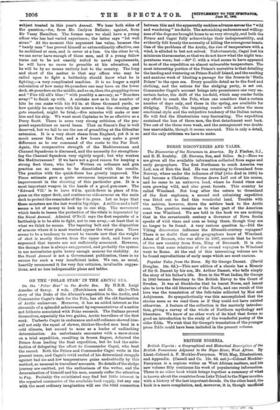ON THE ` POLAR STAR' IN THE ARCTIC SEA.
On the Polar Star' in the Arctic Sea. By H.R.H. Luigi Amedeo of Savoy. 2 vols. (Hutchinson and Co. 42s.)—This story of the Duke of the Abruzzi's expedition to the Arctic, and Commander Cagni's dash for the Pole, has all the old fascination of Arctic endeavour. Moreover, it has an added interest as the chronicle of a splendid achievement by representatives of a nation not hitherto associated with Polar research. The Italians proved themselves, especially the two guides, Arctic travellers of the first rank. Umberto Cagni in endurance and self-reliance showed him- self not only the equal of slower, thicker-blooded men bred in a cold climate, but second to none as a leader of unflinching determination. An unfortunate encounter with a snow-storm on a trial expedition, resulting in frozen fingers, debarred the Prince from leading the final expedition, but be had the satis- faction of delegating the effort to Commander Cagni, who beat the record. Both the Prince and Commander Cagni write in the present tense, and Cagni's vivid recital of his determined struggle against bad ice and low temperatures gains undoubtedly by this method, so unusual in travellers' accounts. No details of the sledge journey are omitted, yet the enthusiasm of the writer, and the determination of himself and his men, scarcely suffer the attention to fag. Probably the uninitiated may find but little interest in the repeated summaries of the available food supply, but any one with the most ordinary imagination will see the vital connection between this and the apparently reckless advance across the "wild and wandering" ice-fields. The astonishing endurance and willing- ness of the dogs are brought home to us very strongly, and both the Prince and Cagni fully acknowledge their indispensability, and evidently felt keenly the necessity of killing the courageous beasts. One of the problems of the Arctic, the rise of temperature with a wind, is alluded to but not solved. Unfortunately, Cagni lost his minimum thermometer, so that we do not know what the night tem- peratures were; but —50° C. with a wind seems to have appeared to most of the expedition an almost unbearable temperature. The most interesting portion of the Prince's narrative is that detailing the landing and wintering on Prince Rudolf Island, and the exciting and anxious work of blasting a passage for the frozen-in Stella Polare' to the open sea. Every possible detail as to the food and clothing, and the rations for the sledging party, is set out. Commander Cagni's account brings into prominence one very un- certain factor, the drift of the ice-field, which may render futile any effort to reach the Pole, when one considers that a certain number of days only, and those in the spring, are available for sledging. Finally, the inquiring reader will notice the more emotional style and the subjective tendency of the Italian nature. He will find the illustrations very fascinating. The expedition sustained the loss of three men, the first detachment sent back. Two out of the three were weak, and the arrangement was doubt- less unavoidable, though it seems unsound. This is only a detail, and the only criticism we have to make.






















































 Previous page
Previous page